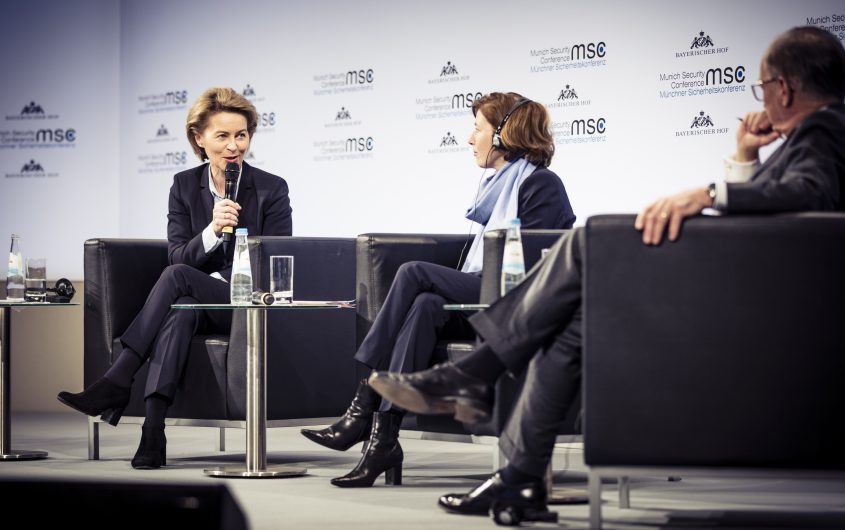
The German Strategic Debate Gets Serious

Stephen F. Szabo
Senior Fellow
Dr. Stephen F. Szabo is a Senior Fellow at AICGS, where he focuses on German foreign and security policies and the new German role in Europe and beyond. Until June 1, he was the Executive Director of the Transatlantic Academy, a Washington, DC, based forum for research and dialogue between scholars, policy experts, and authors from both sides of the Atlantic. Prior to joining the German Marshall Fund in 2007, Dr. Szabo was Interim Dean and Associate Dean for Academic Affairs and taught European Studies at The Paul H. Nitze School of Advanced International Studies, Johns Hopkins University. He served as Professor of National Security Affairs at the National War College, National Defense University (1982-1990). He received his PhD in Political Science from Georgetown University and has been a fellow with the Alexander von Humboldt Stiftung, the Woodrow Wilson International Center for Scholars, and the American Academy in Berlin, as well as serving as Research Director at AICGS. In addition to SAIS, he has taught at the Hertie School of Governance, Georgetown University, George Washington University, and the University of Virginia. He has published widely on European and German politics and foreign policies, including. The Successor Generation: International Perspectives of Postwar Europeans, The Diplomacy of German Unification, Parting Ways: The Crisis in the German-American Relationship, and Germany, Russia and the Rise of Geo-Economics.
As the annual Munich Security conference convenes this weekend, the debate on how Germany and Europe should respond to the Trump administration’s positions on NATO and the European Union (EU) has been accelerating. The recent articles by Thomas Bagger and Jörg Lau and a study by the Stiftung Wissenschaft und Politik on Europe as a strategic actor have followed an openly nationalist speech in Brussels by Secretary of State Mike Pompeo and articles in the American press that have reported that President Trump has come close on a number of occasions to pulling the U.S. out of NATO. Finally, there is the withdrawal of the U.S. from the INF nuclear treaty with Russia.
The intellectual debate in Germany is now showing signs that involve concrete strategic decisions involving the future of European defense. The debate is centered around the question of the permanence of the changes wrought by the Trump administration. Are these of a short-term interregnum nature or do they represent long-term changes in American foreign policy and America’s relations with Europe? Those who contend that Trump is both a symptom and catalyst of change in the transatlantic relationship point to the growing concern in previous administrations about European (and especially German) free-riding on defense and, conversely, the link to the current account deficit with both the EU and especially Germany. In addition, the rise of China and Asia has led to a refocusing of American foreign and security policy toward Asia and especially China. As the latest American security strategy paper points out, the greatest threats to American security come from Great Power revival in the form of China, Russia, and Iran rather than from subnational threats. This echoes the Obama administration’s pivot to Asia and its willingness to cede leadership on the Russian intervention in Ukraine to Germany and the EU. Finally, the American public is war weary after the long military involvements in Iraq and Afghanistan at a time when domestic weaknesses are more and more pressing.
Those who contend that Trump is both a symptom and catalyst of change in the transatlantic relationship point to the growing concern in previous administrations about European (and especially German) free-riding on defense and, conversely, the link to the current account deficit with both the EU and especially Germany.
The German and larger European debate is between those who argue for a policy of continuity to wait out the end of the Trump years with the hope that the U.S. will return to a more normal transatlantic relationship under a Democratic president, and those who believe Europe needs to become more autonomous from the U.S.
There is growing evidence that German policy is beginning to be based on the more pessimistic assumptions of rupture. The recent decision of the German defense ministry to not buy the Lockheed Martin F-35 stealth fighter to replace its aging fleet of Tornados in favor of what appears to be a purchase of either a new Eurofighter produced by Airbus or Boeing’s F-18—or a combination of the two—is a major building block of Germany’s future defense posture. It was known that the German Air Force had preferred the F-35 and was overruled by the defense minister and the Social Democrats in the governing coalition. This decision seems to be based on the desire to foster the European, especially a French and German, defense industrial base, and to provide more autonomy from the U.S. on defense. This follows the recent decision taken by Chancellor Angela Merkel and President Emmanuel Macron to develop a joint Franco-German strategic culture as a step toward a European Army. The Treaty of Aachen includes the formation of a joint Defense and Security Council and increased defense cooperation. In other words, another sign that the hedging strategy is moving in the direction of an independent European defense option at the cost of providing a more effective deterrent to Russia. The F-35 decision will have the effect of further distancing Germany from the U.S. as it undercuts those who favor maintaining the Atlantic connection. It will also provide further ammunition for President Trump, who will argue that more German defense spending should go to buying American, especially given the recent report by the Parliamentary Commissioner for the Bundeswehr of the abysmal state of the German armed forces.
This has the makings of a self-fulfilling prophecy on both sides. As Thomas Valasek, the director of Carnegie Europe and a former Slovak Ambassador to NATO put it, recent talk of a European Army and calls for European autonomy has been “very corrosive” to the relationship with Washington. This comes at a time when the U.S. Congressional delegation to the Munich Security Conference will be the largest in recent history and will be led by House Speaker Nancy Pelosi as a sign of the broad support for the alliance in the United States. The transatlantic relationship is in better shape than it appears. The U.S. commitment to security in eastern Europe has increased in the last three years and both sides are ready to increase sanctions on Russia in protest to its continuing violations of international law in the Kerch Strait. The recent visit of Secretary of State Pompeo to eastern Europe reflects the administration’s growing understanding of the importance of Europe in dealing with China. Let’s hope the gathering in Munich can reassure both sides and be a step in the reconsolidation of a vital alliance.








